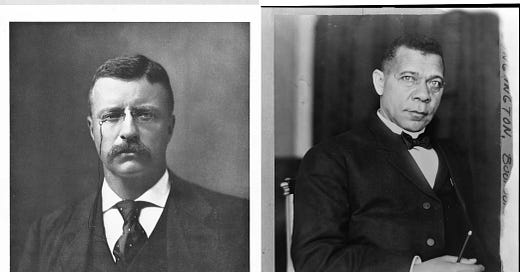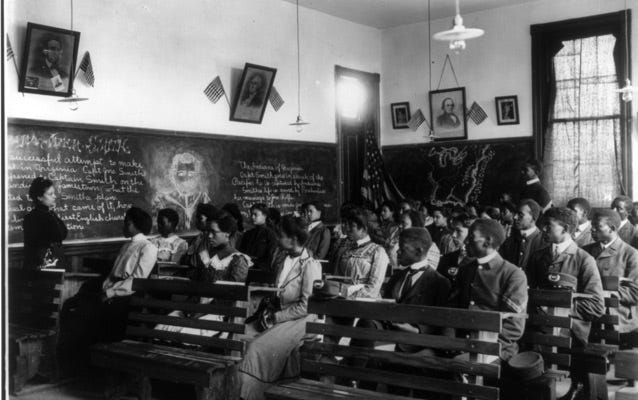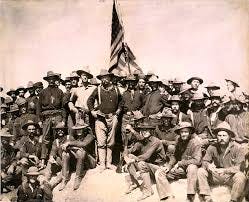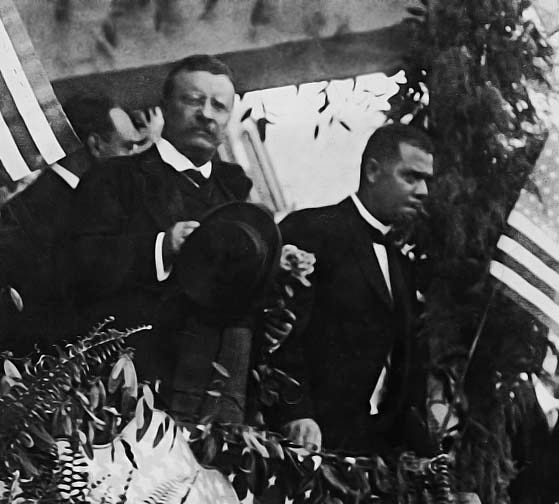By 1901, Booker T. Washington was arguably the most powerful Black man in America, one who commanded respect among Blacks and many whites who felt that his support of social segregation—as outlined in his famous "separate as the fingers...one as the hand" Atlanta Compromise speech in 1895—validated their own desires to continue Jim Crow segregation, a practice that was made the formal law of the land following the U.S. Supreme Court’s 1896 Plessy vs. Ferguson decision.
President Theodore Roosevelt and Tuskegee Founder Booker T. Washington.
Washington, a graduate of Hampton Institute (now University), founded Tuskegee Institute (now University) in Alabama in 1881 with an initial focus on agricultural and industrial education. Washington solicited donations from benefactors all across America, and its early buildings were designed and built by formerly enslaved men who were proud of the educational opportunities that Mr. Washington was providing in Alabama. By 1901, Tuskegee was producing graduates who were creating a strong Black working and middle class.
A history class sits at rapt attention on the Tuskegee campus circa 1902
President Theodore Roosevelt initially ascended to the presidency following the assassination of William Mckinley in 1901, and was not only a scion of a wealthy northern family and former military officer, but at the age of 42, was the youngest man at that time to hold the office of president.
During his time in the Army, Roosevelt, aware that Black soldiers had served with distinction despite overt racism from many white soldiers and officers during the 1898 Spanish American War, was most hopeful that by reaching out to Washington, that the few Black Republicans still allowed to vote in the South, coupled with Black Republicans in other parts of the country, could help him win the 1904 Republican Primary—thus, the invitation to dine at the White House, which Washington graciously accepted.
Then Colonel Theodore Roosevelt and his “Rough Riders”(above) received the newspaper glory following the Battle of San Juan Hill during the Spanish-American War, but Roosevelt knew that his regiment, and his life, were owed to the all-Black Buffalo Soldier units that actually won the battle. Roosevelt, however, saw first hand that notions of white superiority, at least where fighting and courage were concerned, were false.
Predictably, outrage in the South about Washington dining at the White House reached a fevered pitch!
Roosevelt and Washington together on a rostrum
Members of the Southern Press were apoplectic, with the New Orleans Times-Democrat editorial asking "White men of the South, how do you like it? White women of the South, how do you like it?" The Richmond Times opined that the Roosevelt-Washington dinner "means that the president is willing that Negroes shall mingle freely with whites in the social circle—that white women may receive attentions from negro men..."
Sigh…
Teddy Roosevelt, of course, was reelected president in 1904, defeating Democrat Alton Parker despite Parker's winning each state of the former Confederacy (as well as the Civil War slave holding Border States of Kentucky, Maryland, and Delaware.
Booker T. Washington, though never again invited back to the White House, remained arguably the most important Black political, social and educational leader until his death in 1915.
Lest we forget….








